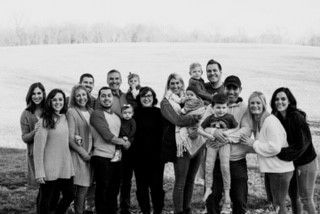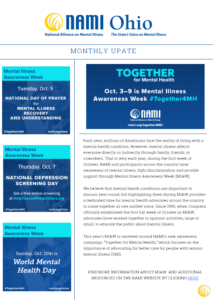
by NAMI Ohio | Oct 18, 2021 | News & Updates, Stories of Inspiration
Lisa Marie Griffin’s life story is a rollercoaster of ups and downs, highs and lows, drugs and sobriety, jail and freedom.
But two points stand out in her memories: flies on a jail window sill and her mother’s fur coat. More on those later.
Lisa Marie (like Elvis’s daughter, she points out introducing herself) is a firecracker of a mental health advocate, survivor, and ex-felon who earlier this year won the Person with Lived Experience Award from the Ohio Crisis Intervention Team statewide program. The nomination called her “dedicated and passionate advocate,” with a “phenomenal presence” and “a story as real as it gets.”
The award is the NAMI Ohio office in Columbus so people can see it, she said.
“I’m still a work in progress,” Lisa Marie said. “I’m a big girl with a big mouth. I used to be a police officer’s worst nightmare. When they came on a call about me, they pulled out the shotgun.”
But she credits supporters at the NAMI’s in Cleveland and Akron with saving her life and transforming her from “attitude to gratitude.”
Lisa Marie, who recently turned 60, was born and currently lives in Akron. She and her late mother, Ruby Rebecca Lee, fought constantly as she grew up. She never knew her birth father; step-fathers made matters worse.
The end result was Ruby shipped her rebellious teenage daughter off to live with a relative in Houston, TX. Lisa Marie graduated from high school there, but immediately began getting in serious trouble with the law when she returned to Ohio to live in Cleveland.
Her lengthy criminal record includes assault, fleeing police in high-speed chases, robbery, theft, a smash-and-grab at a jewelry store, drug abuse, and so many other charges that looking back, Lisa Marie said, “I don’t know who that person was.” She was shot twice, knifed more times than she remembers, and served two sentences in the Ohio Reformatory for Women at Marysville.
She’d been in and out of jail, prison, community corrections facilities, and halfway houses so many times it finally dawned on her: she had spent more than half her life locked up or on probation. “I realized I had been in trouble more than I had been free and that that was a form of slavery. I didn’t want to spend my life looking over my shoulder.”
Lisa Marie was introduced to NAMI and Executive Director Terry Russell in 2003. She trained to be a NAMI peer-to-peer supporter, and eventually did in-service training at the Marysville prison where she had previously been incarcerated.
“NAMI saved my life,” she said.
About those two flies. While involved in chemical dependency class while incarcerated, Lisa Marie was asked to write a list of things she would be grateful for in the future. Spotting two flies on her cell window, she said he would be grateful one day to see flies on the window sill of her own home instead of a prison cell.
She also thinks back to the time she and her mother attended the funeral of a relative. Having finally made up with her mother after 41 years of bitter fighting, Lisa Marie broke down during the funeral, buried her face in her mother’s fur coat, and cried.
“All along I thought she was the knucklehead, and it turned it was me.”
Now, Lisa Marie shares all this and more in speaking to law enforcement about how to deal with “knuckleheads,” as she says.
“You can take your life back,” she says. “People still need us.”

by NAMI Ohio | Oct 14, 2021 | News & Updates
FOR IMMEDIATE RELEASE: October 14, 2021
Contact: Terry Russell, terry@namiohio.org
Columbus, OH: The National Alliance on Mental Illness of Ohio (NAMI Ohio) thanks OhioHealth and their Advanced Practice Providers for their continued commitment to improving the lives of Ohio citizens impacted by mental illness.
This $20,000 donation from OhioHealth will help to support and expand NAMI services for individuals living with mental illness and their family members at 10 local NAMI Ohio affiliates.
According to NAMI Ohio Executive Director Terry Russell, “this donation will allow for the selected affiliates to expand their life saving services and provide support and education in their home communities.” Additionally, Russell states “NAMI Ohio is grateful to the OhioHealth Advanced Practice Providers for recognizing the work of NAMI affiliates and for their commitment to those that we serve.”
The 10 NAMI Ohio affiliates that were identified by OhioHealth to receive a portion of the funding are as follows:
- NAMI Allen, Auglaize, and Hardin
- NAMI Athens
- NAMI Crawford and Marion
- NAMI Delaware and Morrow
- NAMI Fairfield
- NAMI Franklin County
- NAMI Logan/Champaign
- NAMI Richland
- NAMI Seneca, Sandusky & Wyandot
- NAMI Southern Ohio
XXX
The National Alliance on Mental Illness of Ohio (NAMI Ohio) is a 501(c)3 non-profit organization dedicated to helping individuals and families affected by mental illness. NAMI Ohio is comprised of families, persons diagnosed with mental illness, and advocates working together to ensure that Ohioans with mental illness and their loved ones receive the treatment and support they need. The mission of NAMI Ohio is to improve the quality of life, ensure dignity and respect for persons with serious mental illness, and to support their families.

by NAMI Ohio | Oct 12, 2021 | News & Updates
As #MIAW 2021 comes to a close, we want to share with you a story from one of our NAMI Ohio families. The Heck’s have been able to find purpose in the pain of losing their daughter with the creation of the organization 33 Forever, Inc.
The effects of mental illness are felt every day, 365 days a year. Remember with NAMI Ohio, help is available, Reach out today if you or someone you know is struggling to find support.
When Donna and Jeff Heck’s daughter, Danielle Leedy, attempted to take her life the first time when she was 15, the Mansfield couple didn’t know where to turn.
Fortunately, Mary Kay Pierce, head of the National Alliance on Mental Illness Ohio Richland County, was there to help with a shoulder to cry on and resources to help.
In 2019, when Danielle lost her long battle with depression and anxiety, Terry Russell, executive director of NAMI Ohio, helped the Hecks begin a journey no parent ever wants to take.
“NAMI has helped us connect with so many people,” Donna said. “The NAMI Ohio family is so connected and single-minded in mission.”
Donna and Jeff Heck didn’t just cry for their daughter, they bravely forged ahead by establishing 33 Forever https://33forever.life/ a non-profit group created in Danielle’s memory that is aimed at providing education, support and resources for people struggling with mental illness and suicidal ideas. So far, 33 Forever has raised more than $500,000, mostly from small donations.
Along the way, the Hecks wrestled with issues faced by the 1 in 5 Americans who have serious and persistent mental illness, beginning with the unfortunate stigma attached to the disease.
“Our experience with stigma goes back earlier than just losing her, back to when she was 15 and we felt the embarrassment that she attempted it and was admitted to a lockdown unit,” Jeff said.
“We were afraid somebody would question, ‘How could you not have been watching her?’” Donna said. “Other people throw it back in your face.”
More importantly, the Hecks were worried about Danielle “getting labeled inappropriately at 15 with some diagnoses that would follow her forever,” Jeff said. “We didn’t want people to look at Dani as damaged.” For her part, Danielle certainly felt the stigma of her mental illness and suicide attempt but didn’t openly discuss it with friends.
When Danielle died at the age of 33, the Hecks, their other children, family members, and close friends, vowed immediately to be completely open about Danielle’s suicide, even mentioning it in her obituary.
“Otherwise, suicide wins,” Jeff said about fighting back against stigma. “And we would not let that happen. So we got noisy.”
“We have survivor family members whose loved one took their own life who act like it never happened. They never have talked about out and it’s 15 years later,” Jeff said.
“They will never heal if they can’t face the facts that a disease took my loved one,” Donna added. Depression, anxiety, and body issues were Danielle’s biggest challenges. She responded to all of them with anger, her primary reflex, her parents said.
There are no foolproof signs of depression in young people, but the Hecks urge parents to look for anger issues, withdrawal to spend excessive time alone, destructive behavior, changes in lifestyle, dropping grades in school, sleeping too much or too little, eating too much or too little, and dropping activities they once loved.
Among the many supports NAMI provides comes from people with lived experience about how to advocate for your child in the complicated mental health process, the Hecks said.
“Sometimes you just need to fight the system,” Donna said. “When we got in touch with Terry Russell, he told us story after story about people with mental illness. The way he spoke left me with tears running down my face. I knew that passion could save so many people and it could possibly have saved my daughter.”
The couple recently had an opportunity to speak to Gov. Mike DeWine following the Faces of Resilience banquet at The Ohio State University Wexner Medical Center. They came away impressed at the governor’s commitment to mental health.
“He’s clearly not just giving lip service to that effort. He truly believes we’re lagging behind in the mental health system and he’s done a tremendous job freeing up funding,” Donna said
“He relies on NAMI as the advocate for mental illness in Ohio.”
Here is a link to the Hecks being interviewed on a Mansfield TV program.

by NAMI Ohio | Oct 8, 2021 | News & Updates
Reposted from the Cleveland Jewish News: https://www.clevelandjewishnews.com/features/silver_linings/silver-linings-harvey-snider/article_d74242f0-2536-11ec-9e6d-4bf4f283b3a5.html
As a longtime practicing lawyer, Harvey Snider has always had a lot on his plate.
Before retirement, the Beachwood resident consulted on several community boards – all that have culminated into his current primary endeavor: serving on the board of the Alcohol, Drug Addiction & Mental Health Services Board of Cuyahoga County, an organization that is responsible for the planning, funding and monitoring of public mental health and addiction treatment and recovery services delivered to the residents of Cuyahoga County.
Calling the ADAMHS Board a “creature of the Ohio legislature,” Snider said the board is a quasi-public agency with members appointed by members of the governor’s office, the Cuyahoga County executive and the county council office.
His involvement on other local boards ended when he was appointed to the ADAMHS Board in 2006 since many of those boards receive funding from ADAMHS, creating a conflict of interest.
Since 2006, he has served as chairperson on one of the subcommittees of the board and as vice president of the board. He was also recently reappointed to serve another term on the board by Cuyahoga County Executive Armond Budish, who also appointed him four years ago. Previously, he was tapped by former Governors Bob Taft, Ted Strickland and John Kasich.
CJN: What attracted you to ADAMHS?
Snider: What led me to the ADAMHS Board was the inception of NAMI some 30 years ago. A group of Clevelanders on the east side started a support group for families that have had siblings, parents, or loved ones that had mental illness and no support. I was there to help watch the beginning of it along with my late wife. It was called the Alliance for the Mentally Ill back then. It did so well in Shaker Heights, and we had people coming from the west side for support.
That instigated a west side group, and fast forward 18 years later, they merged into NAMI Greater Cleveland. I was president of that east side group, working with my wife to create programming. I eventually became president of NAMI Ohio from June 2005 to June 2009. I worked with all of the chapters across Ohio, supporting families in advocating for the Ohio legislature.
I once testified several times on insurance parity, which I consider one of my biggest accomplishments. Years ago, mental health wasn’t covered by insurance and NAMI testified that the brain is an organ. It should be covered, and ultimately we won.
Eventually, I got a call from the mental health board’s vice president in Cuyahoga County and they asked if I would be interested in serving on the ADAMHS Board. I said yes, and then applied for state appointment, and was appointed. The rest is history.
CJN: Why is mental health an important area for you to focus your efforts?
Snider: I found myself at these kinds of organizations because I saw a need for advocacy in those areas. People were good at thinking of ways to organize and make projects, but one of the things I saw early on at NAMI was a need for advocacy and getting into the political sphere. There was a need for funding and having visibility in the political community. That led me into different areas of advocacy across different organizations.
CJN: Why was volunteering in the mental health community the right way to spend retirement?
Snider: My son had a mental illness suddenly appear as a freshman in college at Indiana University. That has been an illness that has never gone away since. That is what keeps me going. I can never really stop being an advocate as a result of that. He lives in a group home now. I was there at the creation of it and was a board member for some time. This is something I feel I have to continue to do. I knew I needed to find something to do after working as an attorney, and this helps. This work has been very important to me.
CJN: How did your career prepare you for the civic activities you do now?
Snider: My firm was a small partnership firm. We weren’t a big firm. Our practice was general, and in many areas I practiced in, I saw a need in the community for types of services that weren’t out there. For instance, I did a lot of work in the bankruptcy field. I saw the loss of jobs, spouses, single people and families that were forced to build their lives with no help. That charged me.
While Snider has found his volunteering niche, he offers advice for others looking to find new meaning.
“Start with a plan,” he said. “I knew when I closed down my office, I couldn’t close down my life and be a recluse that just exists. By continuing to volunteer in the community and doing good, it’s a win-win. It has been an eye-opener for me. It is a rewarding thing to volunteer, and I’d recommend it to anyone.”
*Harvey Snider is a Past President of the NAMI Ohio Board of Directors”

by NAMI Ohio | Oct 7, 2021 | News & Updates

CLICK TO DOWNLOAD THE MONTHLY UPDATE PDF






